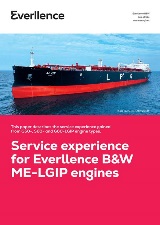Discover more about our LPG-fuelled engines

Overview
Everllence
B&W ME-LGIP engine
The ME-LGIP is the only liquid gas injection dual-fuel engine on the market that allows you to switch between conventional Very Low Sulphur Fuel Oil (VLSFO), Marine Gas Oil (MGO) and LPG fuels with no loss in performance and efficiency. Based on the market leading ME-C engine with uncompromising quality standards, the Everllence B&W ME-LGIP delivers high fuel efficiency and simple installation.
Key facts
- Low-speed, two-stroke engine with high reliability and efficiency
- The standard for LPG carrier propulsion
- Storage and management of LPG is relatively easy
- Lower total cost of operation (OPEX)
- Simple retrofit solution
- Based on well-proven Everllence B&W dual-fuel platform
Dual-fuel means operational security
Everllence B&W dual-fuel engine technologies give you unprecedented financial and operational security.
By switching to LPG, you achieve full compliance with all SOx regulations and get a competitive edge of up to 18% less CO2 emissions, with no loss of performance or efficiency. You also retain the flexibility to use conventional fuels that will allow you to position your asset competitively regardless of market conditions.

Key benefits of the ME-LGIP engine
Compliance
LPG is compliant with sulphur-emission control areas (SECA) regulations and emits lower CO2-emissions which also gives credit towards your IMO EEDI compliance requirements.
Costs
LPG gives you greater financial security; it is traditionally a cheaper fuel than heavy fuel oil yet delivers the same performance and efficiency.Using our dual-fuel engine technology, you can also take advantage of fluctuating fuel prices in the future. Importantly, the ability to use LPG cargo as a fuel source provides significant cost savings for LPG carrier owners or charterers, including reduced time and fees for fuel bunkering.
Retrofits
The compact liquid gas injection system means the Everllence B&W ME-LGIP can also be an ideal upgrade solution for your existing fleet.
The technology can be applied to all types of ships with an ME-C engine of bore size 35, 50, 60 and 70 bore.
Talk to our experts
Power into the future with confidence
There are many ways in which the Everllence B&W ME-LGIP dual-fuel engine can help drive long-term profitability and security for you fleet and business. Contact us today to start exploring your options.

Discover our dual-fuel technologies

B&W ammonia engine development
Everllence is aiming to deliver the first ammonia engine, the Everllence B&W ME-LGIA, to a shipyard in 2025. It will be available as newbuild or retrofit.

B&W ME-GI
The ME-GI engine impresses with extremely lowest methane slip and very high fuel efficiency. It is the most environmentally friendly methane-fuelled engine on the market. By the optional use of fuel oil or LNG/bio-methane/SNG, it represents a highly efficient, flexible, propulsion-plant solution.
- Engine speed: rpm to 56 – 167
- Output: 4,350 – 82,440 kW at L1

The technology of the ME-GIE is based on our successful ME-GI engine. This engine can be operated with liquefied ethane gas (LEG) as well as fuel oil – which makes it the standard choice for ethane carriers. This engine offers very competitive fuel oil and gas consumption, plus operational stability and efficiency due to the diesel principle.
- Engine speed: 72 – 100 rpm
- Output: 8,600 – 21,440 kW at L1

Our ME-LGIM is a dual-fuel engine characterized by its high efficiency and capability of operating on methanol. With a proven record of more than 600,000 operating hours on methanol alone, the engine concept provides a high degree of reliability. When fuelled by green methanol, our ME-LGIM engine can offer truly carbon-neutral propulsion, while reducing sulfur and particle matter emissions significantly at the same time.
- Engine speed: 56 – 125 rpm
- Output: 6,950 – 82,440 kW at L1
Retrofitting vessels for a decarbonized future
Leaders in the shipping industry concur: The maritime energy transition is on the way, and retrofitting engines for greener fuels is very much part of their strategy.

The blueprint for converting VLCVs to methanol
Learn more about the retrofitting of the Maersk Halifax, the first vessel of this size, with a dual-fuel engine to be able to run on methanol.
.jpg?sfvrsn=d59060ac_1)
Tianjin Southwest Picks Up Option for LPG Carrier Dual-Fuel Retrofits
The COSCO Shipping Heavy Industry (Guangdong) yard has announced that it will retrofit the main engines aboard two LPG carriers from the fleet of Tianjin Southwest Maritime Ltd., the Chinese liquefied-gas carrier operator.

Download
Continue reading

Frequently asked questions on LPG-fuelled propulsion technology
Your key questions about the ME-LGIP engine, answered
Learn more about the Everllence B&W ME-LGIP engine – a future-proof solution for clean maritime propulsion.
Methanol combustion in the ME-LGIM engine results in significantly lower greenhouse gas emissions compared to conventional marine fuels. By switching to methanol, ship operators can actively reduce their environmental impact and align with international decarbonization goals. Moreover, methanol can be produced from renewable feedstocks – making it a carbon-neutral fuel when sourced sustainably. The Everllence B&W ME-LGIM engine is a key enabler for climate-conscious vessel operation.
